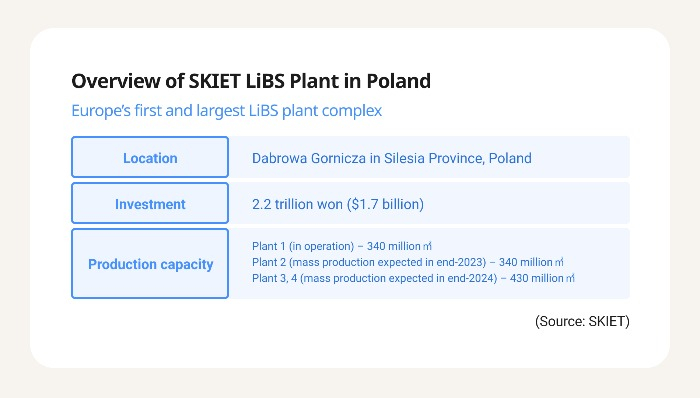DABROWA GORNICZA, Poland – It was not long ago that Dabrowa Gornicza in Silesia Province struggled to bring back the old glory of a vibrant coal mining and steel production center.
But the ninth biggest city in Poland, 300 kilometers from the capital Warsaw, does not have to dwell on its old fame anymore after it has revived as an electric vehicle industrial hub in Europe thanks to SK IE Technology Co. (SKIET), a South Korean electric vehicle material maker that broke ground on Europe’s first EV battery separator plant in the city with a population of about 120,000 in 2021.
“The old mining town is being reborn as a green economic mecca centered around the EV battery,” Marcin Bazylak, mayor of Dabrowa Gornicza, recently told to The Korea Economic Daily at the city hall in the Polish city. “SKIET laid the groundwork for our city’s transformation into an eco-friendly economy.”
A separator is one of three key ingredients of batteries, together with cathodes and anodes, and makes up 10-15% of battery manufacturing costs.
It electronically isolates layers between cathodes and anodes in a battery and serves as a channel where lithium ions move between positive and negative electrodes.


The Korean company is currently running its first LiBS plant with an annual production capacity of 340 million square meters in the southwestern city of Poland.
It aims to commence the commercial production of its second separator plant in the European country with a capacity of 340 million square meters by the end of this year while adding two more plants with a total capacity of 430 million square meters, slated for mass production in the end of 2024.
When the fourth plant starts operating, SKIET will be able to churn out up to 1.54 billion square meters of separators from the facility, the largest separator output in Europe and equivalent to power about 2.05 million electric vehicles, according to the company.
“We are proud of SK’s advance into our city, which is comparable to Neil Armstrong’s planting of an American flag on the moon,” said Mateusz Rykała, vice president of the Katowice Special Economic Zone near Dabrowa Gornicza. “Silesia Province is now famous for the automotive industry among Europeans.”
CENTRAL BUSINESS AND COMMUNITY PARTNER
Since its setup, SKIET Poland (SKBMP), SKIET’s Polish entity, has grown into a core business partner of the southwestern city in Poland.
It has donated about 330 million won to three local vocational schools in Silesia Province as part of its community services.
It has been a sponsor of the Michał Spisak International Music Competition organized by the Municipality of Dabrowa Gornicza and Zagłębie Palace of Culture for three years in a row.
The company also donated about 120 books related to Korean culture, music, art and drama to a public library in Dabrowa Gornicza as part of the Public Library Supporting project.
It has been actively participating in various other community services such as the donation of physical therapy equipment to senior care centers in the city and food and gifts to local orphanages on special days like Christmas.
Of all, SKBMP’s blood donation drive in July 2021, when the Polish city grappled with a blood shortage in the face of the COVID-19 pandemic, made a specially good impression on the company, making the people in the city embrace the Korean company as a member of its community.
“We have built trust among villagers as the company that can stand by them during hardship,” said Park Byoung_chul, CEO of SKBMP.
“SK not only enhances the sustainability of the city but also plays a leading role in improving the image of Korean companies,” said Bazylak.

